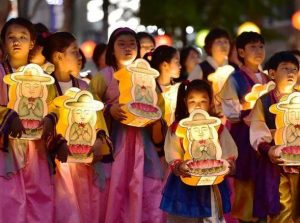
This column is dedicated to Grandmaster Rong Ling of Guan Yin Temple and Ven. Dhammapala, director of Buddhistdoor.com.
This article is a reflection on the festival of the Buddha’s Birthday. The theme is about rebirth (I do not mean samsaric rebirth) and a new life of happiness and freedom under the guidance of our Lord, the Bhagavat, the Teacher of Gods and Men.
In almost all religions, the idea of rebirth is a constant motif if not a central one. Rebirth represents a “dying” of the old life and the advent of a new one oriented towards service, charity, and selflessness. The rituals of many different faiths honour this commitment of abandoning the old ways and embracing a new kind of thinking – one that does not conform to what everyone else thinks, but to one’s own conscience and budding compassion and wisdom. Taking refuge in the Buddha, Dharma, and Sangha represents the “death” of old bad habits and cravings, and the activities of prayer, devotion and service embody the resolution to live a “new” life. Of course, this life is not ontologically foreign, because all beings possess the transcendent face of the Buddha – Buddha Nature.
In the Pure Land tradition, a very clear and specific vision of rebirth is recorded in the sutras. Upon dying and taking the hand of Amit?bha, a devotee finds himself or herself born within the petals of a holy lotus (Contemplation Sutra, 344b, 20). This is the beautiful beginning of a new spiritual body, whereupon five hundred rays of coloured light illuminate the sitting disciple as the petals open. Depending on one’s grade of rebirth (344c, 22), one’s lotus might immediately blossom and open, or it may remain shut for many aeons before one’s unwholesome karma is finally exhausted. But in any case, liberation (even if it takes aeons) is never impossible. The compassionate Buddha excludes no being, and the chance for progress and salvation is open throughout all lifetimes and worlds.
Whatever one’s future may be, being reborn in this lotus is the beginning of one’s mystical destiny toward bodhisattvahood and Buddhahood. One leaves samsara behind and quite literally dies to be reborn into the Land of Ultimate Bliss, to continue the journey of benefiting all beings.
In the samsaric travails of the modern world, we find that few things unfold precisely as we would prefer – in fact, very often, the processes and outcomes of many personal, social, and global events are far from ideal. Even a cursory glance at the newspaper reveals the wider concerns within this world-system, which is now subject to destruction by human beings in their desecration of Earth’s environment. Across Earth, the wounds of greed, hatred and delusion leave fresh cuts and lashes across the landscapes and seascapes, cities and villages, and the hearts of all beings. The calling to be reborn in a humbler, more spiritual way of life is never outdated.
The Buddhist vocation is modeled around the figure of Shakyamuni, and hence should be one of justice, compassion, and ethical reflection. As a prince, Gautama was troubled by the meaningless and gross suffering of the world, and found rebirth in the moral and religious journey. Shakyamuni spent His life working for, in the larger picture, the betterment of society, and on the individual level, a reorientation of the mind. Buddhists seek to be practitioners of strong morality, which entails justice, compassion, and skilful decision-making. What it does not entail is judgementalism and callous condemnation of “the world”. Rather than plunging into extreme views and deluded attachments, the advice of the Buddhist saints is clear and urgent: “Release the Three Poisons and find freedom!”
Being reborn and adopting a new way of life, particularly one that prioritizes spirituality over materialism and frugality over indulgence and extravagance, is not easy. While the Buddha encouraged moneymaking and security in wealth for laypersons, practicing the Middle Way in modern life is not only difficult in a social sense (we compare ourselves to our peers and to our relevant culture at large), but a psychological sense as well. Many struggle with their attachment to ways of thought that feed the zeitgeist of making profit or “materially gaining more than you lose”. By contrast, courageous and mature choices that involve a degree of sacrifice are overlooked. Power structures that value only the profits made by an individual play a part in such oversights. As such, working for a more just and sustainable world is a task that feels impossible in the short-run and offers no quick results. But for many, the call of the conscience is something that is too loud to block out. And that is a very happy fact.
May this year’s birthday of the Buddha herald renewal, encouragement, and rebirth for all disciples in body and mind.












